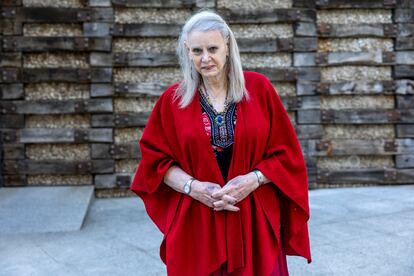Deirdre McCloskey, economist: ‘Big states prevent people from growing’
The liberal American academic claims that Trump is running for office only to avoid going to prison. That’s why her vote in November will be for Kamala Harris

Deirdre McCloskey — an 81-year-old economic historian — crosses herself every time she mentions Adam Smith. A die-hard liberal (with a great sense of humor) from Ann Arbor, Michigan, she once taught alongside Milton Friedman and is the author of Why Liberalism Works (2019). Interestingly, McCloskey — who has been nominated several times for the Nobel Prize in Economics — was a follower of Marx in her youth.
She’s all about radical contrasts. At the age of 53 — while married with two children — she decided to undergo a gender transition. And, once an agnostic, she’s now a fervent disciple of the Episcopal Church.
Her interview with EL PAÍS takes place at the Rafael del Pino Foundation in Madrid. Her voice — which she has surgically altered several times, in an attempt to soften it — sounds metallic and raspy. She stumbles on certain words (she has a stutter) and doesn’t shy away from any subject. With pain in her voice, she shares that her children have broken all ties with her and that she doesn’t know her grandchildren. Still, McCloskey is optimistic about the future of humanity. For her, the state is the great enemy.
This interview has been updated with two questions answered by McCloskey via email.
Question. You cross yourself whenever you mention Adam Smith. Why do you do that?
Answer. I hold him in very high regard. He was something like the founder of economics. There were trailblazers in France and Spain… but he gathered the information and, in 1776, wrote The Wealth of Nations. He was a fierce liberal: throughout his life, he opposed slavery. And what I also like about him is that he was funny. He made jokes. 18th century jokes.
Can I tell you something interesting? His father was a customs agent. And, for the last 10 years of his life, so was he!
Indeed, in 1778, Smith was appointed to be the commissioner of customs in Scotland.
Q. A surprise from a supporter of tax abolition.
A. But back then, governments were small, representing 5% of total wealth. Now, in Spain, the United States, France… wherever you go, governments are 50% in size.
Q. Can you explain why you think the smaller the state, the better?
A. Big states prevent people from growing. I use another word to define liberalism: adultism. I would like us all to be mature adults… not children.
Q. You advocate humanitarian liberalism. What does that mean?
A. As a liberal, I love individuals. I love people. In other political movements, there’s a tendency to love certain groups of the population. Whites, but not Blacks. Christians, but not Jews. I’m also a humanist in another sense of the word: academically. When I was 30, I studied literature and taught some classes. I’m convinced, as Keynes said, that someone who is only an economist cannot go far.
Q. You don’t like the word capitalism. Can you explain why?
A. It seems that everyone becomes rich through the accumulation of wealth. That’s what Marx and Adam Smith believed. But I don’t think this idea is valid today, which is why I’m in favour of changing the name. The pure accumulation of capital doesn’t make us rich. Would it help you to have six cars? In the year 1800, in Spain, people lived on [the equivalent of] two euros a day. Today, the figure is about 100 euros a day. This complete transformation is due to innovation. The essayist Virginia Postrel calls it dynamism. I call it innovism. The word “capitalism” simply leads us astray.
Q. You believe that liberalism has to reach the heart to convince us. With what arguments?
A. I was a folk singer in the 1960s. I know all the social songs from that time. I used to sing them… but unfortunately, I can no longer do so. Appealing to the heart – as the songs do – is crucial. If you’re a socialist, you have to have an attachment to socialism. If you’re a fascist, you have to love the leader. But liberalism is too reasonable. It’s not passionate. We have to stop saying that the free market is good just because you get a 10% increase in your income. That’s true, but it doesn’t move anyone.
Q. Who do you plan to vote for in the presidential elections?
A. For Kamala Harris. Trump is running only to avoid going to prison; he has no real political convictions. But his advisers do. And their convictions – expressed via Trump’s careless rhetoric – are fascist. Encouraging violence as a political tool? Done! Trying to corrupt the legal system to crush the opposition? Done! Proposing to put 11 million people in concentration camps? Done! Undermining legitimate elections Venezuelan-style? Done!
Q. You liked Biden. What’s your opinion of Kamala Harris?
A. Personality matters. We need virtuous leaders, at least minimally virtuous. Even his supporters acknowledge that Trump is a very, very bad man: a liar, a cheat, an adulterer, cruel, irresponsible and dishonest in every sense. His Evangelical supporters defend him as “God’s imperfect vehicle,” in the style of King David. Biden and Harris are at least minimally ethical.
Q. In countries where liberalism comes to power, politicians – in addition to making economic decisions that go along the lines you defend – frequently implement very strict social policies, such as Javier Milei, who intends to prohibit abortion in Argentina. What do you think of this?
A. I think he’s wrong. I believe in a woman’s right to choose.
Q. What’s the liberal position on someone changing their gender?
A. Liberalism defends individual rights over collective or state rights… [the notion that] each person can do what they want. If someone wants to have a gun to shoot people, they must be stopped. But if they want to wear a skirt, leave them alone. That’s my experience in the liberal movement. They have no problem with what I’ve done [in my personal life].
By the way, many [neoliberals] are gay. I was a heterosexual man, I was with the woman of my life... once I transitioned, my mother told my sister: “I can understand that she changed her gender, but what I don’t understand is that she decided to become a Christian.” She was an atheist. And very funny.
Q. Many of the voices defending trans people come from the so-called “woke” culture. What do you think about this movement?
A. It’s desirable to stay woke. Woke reminds us that the United States has a problem with race. Sometimes, [those associated with this idea] can be irritating… but the thing is that we really have a serious problem with race. There are other woke derivatives that I don’t like, such as trans-exclusionary feminists. What matters for the life of someone who is trans is that people – as individuals – accept them.
Sign up for our weekly newsletter to get more English-language news coverage from EL PAÍS USA Edition
Tu suscripción se está usando en otro dispositivo
¿Quieres añadir otro usuario a tu suscripción?
Si continúas leyendo en este dispositivo, no se podrá leer en el otro.
FlechaTu suscripción se está usando en otro dispositivo y solo puedes acceder a EL PAÍS desde un dispositivo a la vez.
Si quieres compartir tu cuenta, cambia tu suscripción a la modalidad Premium, así podrás añadir otro usuario. Cada uno accederá con su propia cuenta de email, lo que os permitirá personalizar vuestra experiencia en EL PAÍS.
¿Tienes una suscripción de empresa? Accede aquí para contratar más cuentas.
En el caso de no saber quién está usando tu cuenta, te recomendamos cambiar tu contraseña aquí.
Si decides continuar compartiendo tu cuenta, este mensaje se mostrará en tu dispositivo y en el de la otra persona que está usando tu cuenta de forma indefinida, afectando a tu experiencia de lectura. Puedes consultar aquí los términos y condiciones de la suscripción digital.









































